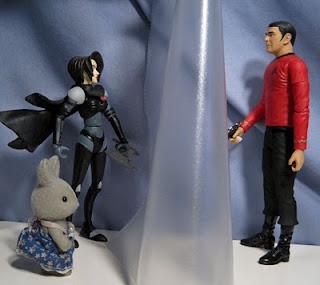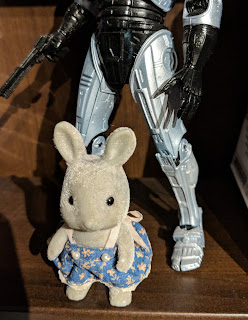Bright of the Sky
Bright of the Sky (Book One of The Entire and The Rose)
Kay Kenyon, 2007
Kay Kenyon, 2007
Premise: Two years and a bit ago, Titus Quinn, starship pilot, vanished, along with wife, child and ship. A few months later he was picked up on another planet, raving about having spent ten years prisoner in a parallel dimension. Now the company he worked for suddenly thinks there might be something to this theory, and Quinn is going back, ostensibly to negotiate for routes that humans can use for travel, but really to look for his lost family.
I picked this up as a Kindle Freebie. I'm not sure it was worth free.
The “Entire,” the other dimension, is an interesting construction much of the time. Ruled by the alien Tarig, it seems to be a universe entirely composed of one twisty landscape. The sky is not a sky, but a river of ever-burning energy, and the “storm walls” keep the Entire structural where it touches our universe. (The whole thing is based vaguely on brane theory. It even cites the name.) The denizens of the Entire include many different types of sentient beings, and they call our universe The Rose, because they have no flowers. (Don't ask me how their plants work.)
Meanwhile, the future human universe is a semi-dystopian Big Business style society. It's not interesting, and the characters based there are two-dimensional and dull.
The narrative voice, however, is the worst part of this book. It's by turns familiar and pretentious, with occasional lapses into unearned poetry. The character focus changes somewhat randomly, which means that I end up knowing things about minor character's motivations that are unnecessary or would be better seen from a different character's point of view. I hate that. Yes, it's a pet peeve of mine, but I think it's a fair one. Don't switch your character focus in the middle of a scene! If you have to tell me what the other character thought, do it later: have her talk to a third character or think to herself later about how happy/angry/excited she is. Don't switch your close focus back and forth. Some authors can do this and not have it feel wrong; most can't.
The characters, particularly Titus, are largely unlikeable, and it takes forever for the story to pick up speed. About halfway through it starts to pick up a little, and then the author kept ruining it with idiotic asides.
They faced off, each with his own view of the world. Of course it could not be the same view.The chapters about Sydney (Titus' daughter who grew up alone in the Entire) are the best, but boil down to fairly normal fantasy cliches (imprisoned daughter has destiny, inner strength, blah blah), and the occasional step back to the normal universe to catch up with the utterly forgettable characters there is terrible.
There were a few strong ideas here, but it never pulled off any interesting or tense scenes.
1 Star – Didn't Much Like This




Comments
Post a Comment
FYI: Most comments are moderated, and will not appear immediately.